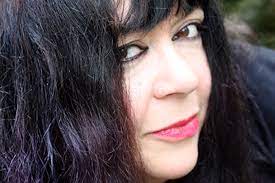
I’ve read Dara Wier’s sonnet “Scorch Marks” many times, and my favorite line is its description of my favorite birds (and frequenters of many of my own poems), crows. Wier writes, “The crows look at us in their crooked / Ways. They converse and inverse and walk like the mechanics / Of mystery they are.”
And, happily enough, the crows are not the only mechanics of mystery in this poem. But they are one of many references to the color black, starting with the title, followed by a black swan and then the pupils of eyes and then that universal symbol of crushing depression, the black dog.
As is often the case, the secret lies in the pronouns. The narrator uses the first-person plural “we” and is addressing a second-person singular “you.” Only who is this “you” and where might that “you” be now?
As for the last line, it’s a wonderful finish for any work of literature that might use an unreliable narrator: “Who are we to believe what we say?” Many readers are convinced that any first-person point of view, be it the singular “I” or the plural “we,” is as suspect as John Wilkes Booth. We all, in other words, view the world through our own glasses darkly, and no two glasses are alike.
Don yours, why don’t you? See what you make of the poem. It’s a great example of the reader-writer compact. The writer leaves enough ambiguity for the reader to bring in all her baggage and get comfortable for a few days’ visit.
“What’s that I smell cooking?” the reader asks.
“You tell me,” the writer answers.
Scorch Marks
Dara Wier
Whenever we find wide black swaths burned across our paths
We think of you. Our friend the black swan turns to look
At us frequently when we pass by its pond. We see your back
Far away deep inside the pupils of those we love. We stare
And we stare where we are. That is what we do. It make us
Look as if we’ve misplaced our minds or perhaps replaced
Ideas of mind with some new stronger fog. I feel you
Fading and find you falling for that feeling, you staring farther
Into one of the farthest vanishing points in the universe.
We find this alarming. We are losing track of something.
Our friend the black dog watches us carefully as we walk by
The door she guards. The crows look at us in their crooked
Ways. They converse and inverse and walk like the mechanics
Of mystery they are. Who are we to believe what we say?


